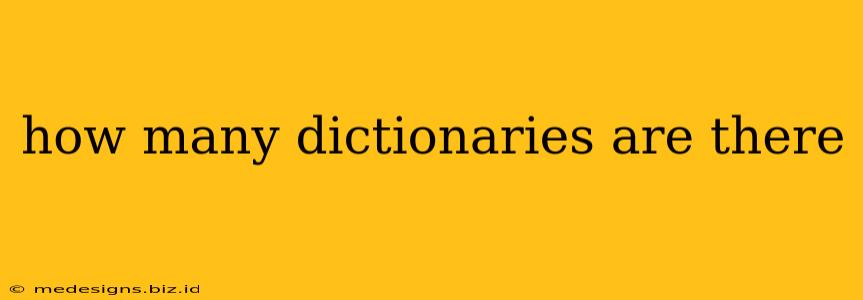How Many Dictionaries Are There? A Surprisingly Complex Question
The simple answer to "How many dictionaries are there?" is: a lot. But the real answer depends heavily on how you define "dictionary." Are we talking about physical printed dictionaries? Online dictionaries? Specialized dictionaries for specific fields? Dictionaries in different languages? The number balloons dramatically depending on how broadly we define our terms.
Defining the Scope: What Counts as a Dictionary?
To even begin estimating, we need to be specific. Consider these categories:
- Printed Dictionaries: This includes everything from pocket-sized bilingual dictionaries to massive, multi-volume unabridged works like the Oxford English Dictionary. Counting these requires researching publishing houses worldwide and accounting for different editions and print runs – a near-impossible task.
- Online Dictionaries: Websites like Merriam-Webster, Dictionary.com, and Wiktionary are constantly updated. New online dictionaries are created regularly, making any count quickly outdated. Furthermore, counting individual entries within these resources would be a monumental undertaking.
- Specialized Dictionaries: These cater to niche areas like medicine, law, engineering, and even gaming slang. The number of these specialized lexicons is vast and difficult to track.
- Dictionaries in Different Languages: Each language has its own dictionaries, many with multiple versions. This exponentially increases the overall number. Think of all the languages spoken worldwide, each with potentially numerous dictionaries!
The Impossibility of a Precise Number
Given the points above, arriving at a precise number of dictionaries is practically impossible. The sheer volume, the constant evolution of online dictionaries, and the difficulty in accessing comprehensive global data on publishing make a definitive answer elusive.
Why the Question Matters (Beyond Simple Curiosity)
While an exact number remains unobtainable, understanding the vastness of lexicographical resources highlights a few key points:
- Accessibility to Information: The abundance of dictionaries underscores the incredible wealth of linguistic information available today.
- Evolution of Language: The creation and updating of dictionaries reflect the ever-changing nature of language itself. New words, phrases, and meanings constantly emerge, requiring ongoing lexicographical work.
- Cultural Diversity: The multiplicity of dictionaries in various languages speaks volumes about the world's linguistic diversity and the importance of preserving and understanding different cultures.
Approaching the Question Practically
Instead of seeking a single, unachievable number, it's more fruitful to focus on the breadth and depth of lexicographical resources. Understanding the different types of dictionaries – from general-purpose to highly specialized works – gives a clearer picture of the vast landscape of linguistic knowledge. The sheer scale of the task of compiling even a single dictionary is a testament to human dedication to language and knowledge. Therefore, while we can't answer "how many?" definitively, appreciating the magnitude of the effort involved in creating and maintaining these resources is far more insightful.
